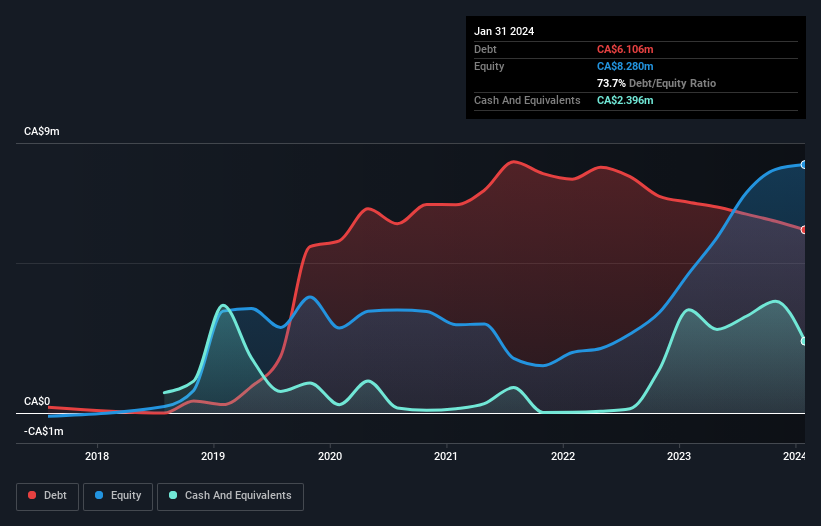CanadaBis Capital (CVE:CANB) Has A Pretty Healthy Balance Sheet
The external fund manager backed by Berkshire Hathaway's Charlie Munger, Li Lu, makes no bones about it when he says 'The biggest investment risk is not the volatility of prices, but whether you will suffer a permanent loss of capital.' When we think about how risky a company is, we always like to look at its use of debt, since debt overload can lead to ruin. Importantly, CanadaBis Capital Inc. (CVE:CANB) does carry debt. But the real question is whether this debt is making the company risky.
When Is Debt Dangerous?
Generally speaking, debt only becomes a real problem when a company can't easily pay it off, either by raising capital or with its own cash flow. Part and parcel of capitalism is the process of 'creative destruction' where failed businesses are mercilessly liquidated by their bankers. While that is not too common, we often do see indebted companies permanently diluting shareholders because lenders force them to raise capital at a distressed price. Having said that, the most common situation is where a company manages its debt reasonably well - and to its own advantage. When we think about a company's use of debt, we first look at cash and debt together.
See our latest analysis for CanadaBis Capital
How Much Debt Does CanadaBis Capital Carry?
As you can see below, CanadaBis Capital had CA$6.11m of debt at January 2024, down from CA$7.03m a year prior. However, it also had CA$2.40m in cash, and so its net debt is CA$3.71m.

How Healthy Is CanadaBis Capital's Balance Sheet?
We can see from the most recent balance sheet that CanadaBis Capital had liabilities of CA$9.99m falling due within a year, and liabilities of CA$5.22m due beyond that. On the other hand, it had cash of CA$2.40m and CA$2.47m worth of receivables due within a year. So its liabilities total CA$10.3m more than the combination of its cash and short-term receivables.
This deficit is considerable relative to its market capitalization of CA$11.8m, so it does suggest shareholders should keep an eye on CanadaBis Capital's use of debt. Should its lenders demand that it shore up the balance sheet, shareholders would likely face severe dilution.
We use two main ratios to inform us about debt levels relative to earnings. The first is net debt divided by earnings before interest, tax, depreciation, and amortization (EBITDA), while the second is how many times its earnings before interest and tax (EBIT) covers its interest expense (or its interest cover, for short). This way, we consider both the absolute quantum of the debt, as well as the interest rates paid on it.
While CanadaBis Capital's low debt to EBITDA ratio of 0.98 suggests only modest use of debt, the fact that EBIT only covered the interest expense by 7.0 times last year does give us pause. So we'd recommend keeping a close eye on the impact financing costs are having on the business. And we also note warmly that CanadaBis Capital grew its EBIT by 13% last year, making its debt load easier to handle. There's no doubt that we learn most about debt from the balance sheet. But it is CanadaBis Capital's earnings that will influence how the balance sheet holds up in the future. So if you're keen to discover more about its earnings, it might be worth checking out this graph of its long term earnings trend.
Finally, while the tax-man may adore accounting profits, lenders only accept cold hard cash. So it's worth checking how much of that EBIT is backed by free cash flow. During the last two years, CanadaBis Capital produced sturdy free cash flow equating to 70% of its EBIT, about what we'd expect. This cold hard cash means it can reduce its debt when it wants to.
Our View
Both CanadaBis Capital's ability to to convert EBIT to free cash flow and its net debt to EBITDA gave us comfort that it can handle its debt. On the other hand, its level of total liabilities makes us a little less comfortable about its debt. Considering this range of data points, we think CanadaBis Capital is in a good position to manage its debt levels. Having said that, the load is sufficiently heavy that we would recommend any shareholders keep a close eye on it. The balance sheet is clearly the area to focus on when you are analysing debt. However, not all investment risk resides within the balance sheet - far from it. Be aware that CanadaBis Capital is showing 4 warning signs in our investment analysis , you should know about...
If you're interested in investing in businesses that can grow profits without the burden of debt, then check out this free list of growing businesses that have net cash on the balance sheet.
New: AI Stock Screener & Alerts
Our new AI Stock Screener scans the market every day to uncover opportunities.
• Dividend Powerhouses (3%+ Yield)
• Undervalued Small Caps with Insider Buying
• High growth Tech and AI Companies
Or build your own from over 50 metrics.
Have feedback on this article? Concerned about the content? Get in touch with us directly. Alternatively, email editorial-team (at) simplywallst.com.
This article by Simply Wall St is general in nature. We provide commentary based on historical data and analyst forecasts only using an unbiased methodology and our articles are not intended to be financial advice. It does not constitute a recommendation to buy or sell any stock, and does not take account of your objectives, or your financial situation. We aim to bring you long-term focused analysis driven by fundamental data. Note that our analysis may not factor in the latest price-sensitive company announcements or qualitative material. Simply Wall St has no position in any stocks mentioned.
About TSXV:CANB
CanadaBis Capital
Engages in the production and sale of recreational cannabis and cannabis extracts in Canada.
Moderate risk with mediocre balance sheet.
Market Insights
Community Narratives





